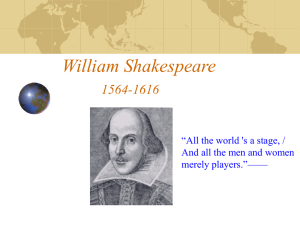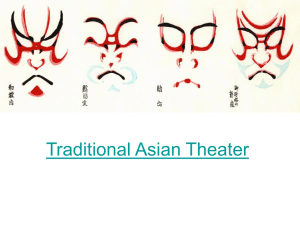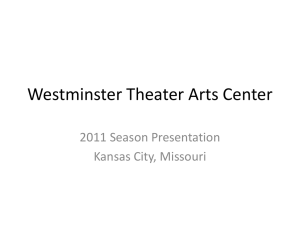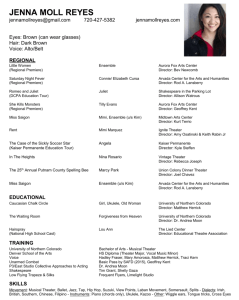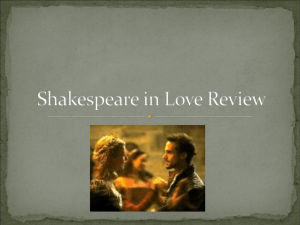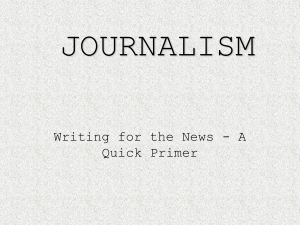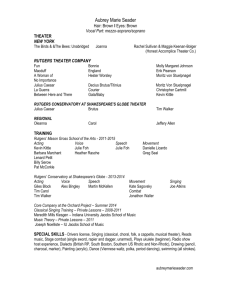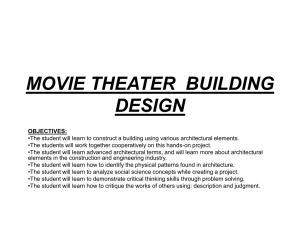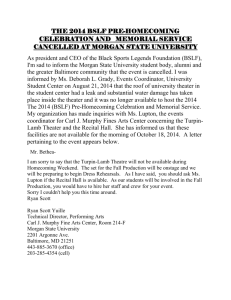Triple Play: Audience Engagement Bright Spots
advertisement
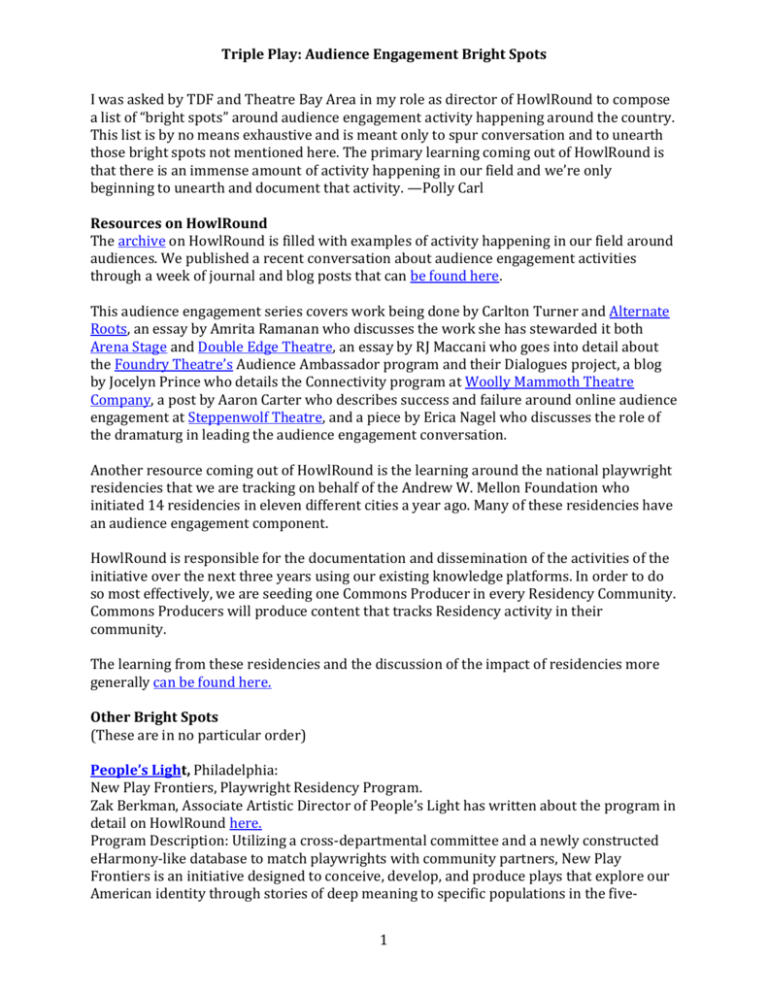
Triple Play: Audience Engagement Bright Spots I was asked by TDF and Theatre Bay Area in my role as director of HowlRound to compose a list of “bright spots” around audience engagement activity happening around the country. This list is by no means exhaustive and is meant only to spur conversation and to unearth those bright spots not mentioned here. The primary learning coming out of HowlRound is that there is an immense amount of activity happening in our field and we’re only beginning to unearth and document that activity. —Polly Carl Resources on HowlRound The archive on HowlRound is filled with examples of activity happening in our field around audiences. We published a recent conversation about audience engagement activities through a week of journal and blog posts that can be found here. This audience engagement series covers work being done by Carlton Turner and Alternate Roots, an essay by Amrita Ramanan who discusses the work she has stewarded it both Arena Stage and Double Edge Theatre, an essay by RJ Maccani who goes into detail about the Foundry Theatre’s Audience Ambassador program and their Dialogues project, a blog by Jocelyn Prince who details the Connectivity program at Woolly Mammoth Theatre Company, a post by Aaron Carter who describes success and failure around online audience engagement at Steppenwolf Theatre, and a piece by Erica Nagel who discusses the role of the dramaturg in leading the audience engagement conversation. Another resource coming out of HowlRound is the learning around the national playwright residencies that we are tracking on behalf of the Andrew W. Mellon Foundation who initiated 14 residencies in eleven different cities a year ago. Many of these residencies have an audience engagement component. HowlRound is responsible for the documentation and dissemination of the activities of the initiative over the next three years using our existing knowledge platforms. In order to do so most effectively, we are seeding one Commons Producer in every Residency Community. Commons Producers will produce content that tracks Residency activity in their community. The learning from these residencies and the discussion of the impact of residencies more generally can be found here. Other Bright Spots (These are in no particular order) People’s Light, Philadelphia: New Play Frontiers, Playwright Residency Program. Zak Berkman, Associate Artistic Director of People’s Light has written about the program in detail on HowlRound here. Program Description: Utilizing a cross-departmental committee and a newly constructed eHarmony-like database to match playwrights with community partners, New Play Frontiers is an initiative designed to conceive, develop, and produce plays that explore our American identity through stories of deep meaning to specific populations in the five1 Triple Play: Audience Engagement Bright Spots county region surrounding People’s Light. Starting in April, the first six playwrights participating in this program will begin their multi-week residencies, embedded in local communities to inspire their new work. They are Eisa Davis, Colman Domingo, Kate Fodor, Karen Hartman, Dominique Morisseau, and Kathryn Petersen. Center for Performance and Civic Practice, Director, Michael Rohd: The CPCP researches, aggregates, innovates and supports Civic Practice (the production of new theatre work that originates in partnership between artists and non-arts centered organizations in service to the needs of the non-arts partner). The Center defines Civic Practice not solely as plays, but as theatre activity of diverse forms in varied public and private contexts. The initiating impulse for this work falls on a spectrum of desired outcomes: Advocacy, Dialogue, Story-Sharing, Civic Application & Cross-Sector Innovation. Artists engage in producing new work across this spectrum in communities around the nation with regularity, but due to the frequent low visibility of these projects and a scarcity of shared vocabulary, the way we integrate them into ongoing national cross field dialogue is severely limited. Dialogues about theatre, civic discourse and public utility most often focus on approaches bound up in existing institutional and formal models of audience engagement. Projects that utilize tools of meaning-making and collaboration to produce work of public utility and civic activity require advocacy and capacity-building. Michael has written extensively about the work on a series on HowlRound titled “Translations” and that series can be found here. The Triangle Lab at Cal Shakes and Intersection for the Arts: Cal Shakes and Intersection created the Triangle Lab out of a shared vision for integrating art into community life. Together, we imagine a theater of and for the 21st Century that defies boundaries and pushes past physical and structural constraints. This theater is not defined or burdened by imposing buildings, or constrained to a production as its only moment of exchange between artists and community. Through the work of the Triangle Lab, theater is on the street, in the classroom, at the park, on the bus, inside, outside, everywhere. And, the experience of theater is wildly participatory and alive. Rebecca Novick who runs the lab provides some context for it here. Cornerstone Theater Company, Los Angeles: Cornerstone has been doing this work for a long time so much more to document than can be covered here. Radical Hospitality, Mixed Blood Theatre, Minenapolis: Radical Hospitality provides no-cost access to all mainstage productions for any audience member. An expansion of Mixed Blood’s egalitarian mission, Radical Hospitality erases economic barriers in pursuit of building a truly inclusive, global audience. Whether a patron is a long-time Mixed Blood attendee, a new immigrant living in Mixed Blood’s Cedar2 Triple Play: Audience Engagement Bright Spots Riverside neighborhood, a person with low income or disabilities, a college student, or someone who has never been to theater, he or she will be welcomed, free of charge—with radical hospitality There is an in-depth conversation about Radical Hospitality here. Network of Ensemble Theaters held a series of Microfests: Microfests were held in Honolulu, Detroit, New Orleans, and Kentucky/Tennessee. The Micro-Fest USA cycle is an advocacy tool—these events make the case that the arts and theater are as vital to healthy communities as hospitals. The benefit of this advocacy is long-term and far-reaching, and impacts us all. The learning from those microfests can be found on the NET site here. All of the microfests were livestreamed and can be found on HowlRound TV. Here is the link to the Honolulu fest. The Latino/a Theatre Commons The Latina/o Theatre Commons (LTC) is a movement made up of passionate, articulate, driven Latina/o theater artists, producers, and scholars from across the country. The LTC advocates for Latina/o theater as a vital, significant presence in the not-for-profit theater sector. Infrastructure for the LTC is provided by HowlRound: A Center for the Theater Commons. We are a think tank, a lobbying network, and a resource for the field and for each other. We create and produce nationally recognized events and publish regular online content via Café Onda. All that we do seeks to celebrate our diverse connections, to honor our past with reflection, and to envision our future with optimism and enthusiasm. All of the learning can be found here. The Public Works Program at the Public Theater, NYC PUBLIC WORKS is a major new initiative of The Public Theater that seeks to engage the people of New York by making them creators and not just spectators. Working with community partner organizations in all five boroughs, PUBLIC WORKS will invite members of diverse communities to participate in theater workshops, to attend classes, to attend productions, and to become involved in the daily life of The Public. Under the leadership of Public Works Director Lear deBessonet, PUBLIC WORKS will deliberately blur the line between professional artists and community members: it will create theater that is not only for the people, but by and of the people as well Ten Thousand Things Theater, Minneapolis Ten Thousand Things brings lively, intelligent theater to people with little access to the wealth of the arts—who in turn help us to re-imagine theater. See a conversation with Artistic Director, Michelle Hensley here. 3

